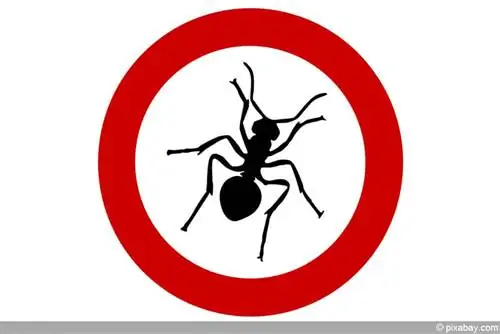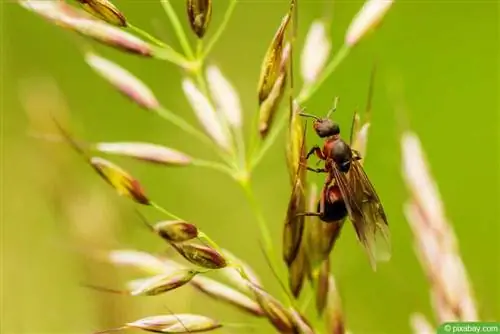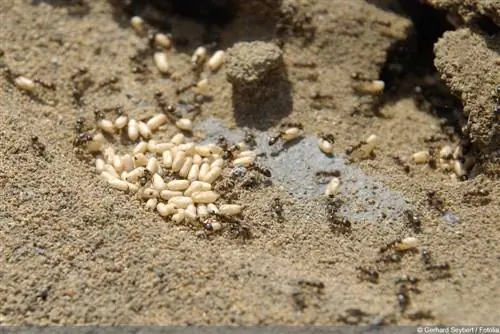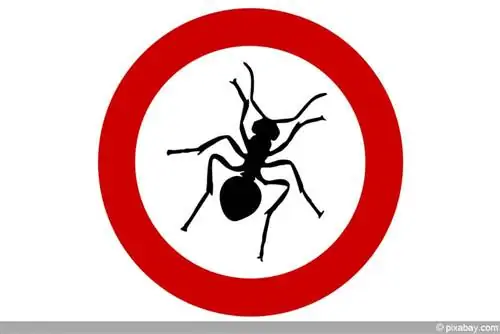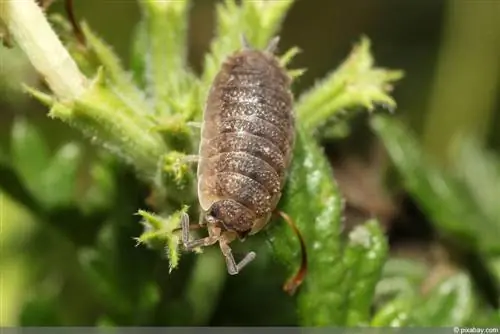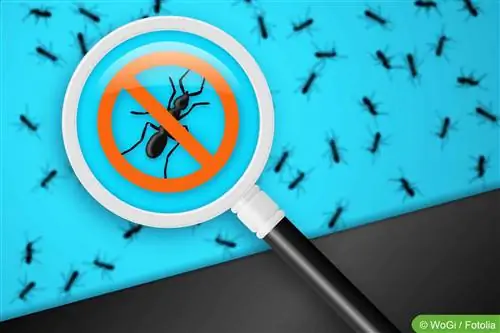- Author admin caroline@plants-knowledge.com.
- Public 2023-12-17 03:39.
- Last modified 2025-06-01 06:48.
Every year after spring, when it gets warmer outside, ants come into homes and offices. The small insects are very useful in nature. However, they are not wanted in the house. They can cause enormous damage to the building structure. How do you manage to banish the little creepy crawlies from your house and garden? Are there natural ant remedies that help?
The benefits of natural ant remedies
Especially if there are small children in the household, you should use natural ant repellents and avoid chemicals. Small children often react sensitively to the substances they contain. Chemical agents, available as bait cans, powders or sprays, work through poison. This can also harm other beneficial insects. Natural ant remedies that rely on moving, repelling, deterring or thwarting the ant trails can effectively eliminate the problem in most cases.
IMPORTANT:
All wood ants that build mounds have been protected in Germany for many years. Nevertheless, the ant population in the forests continues to decline, with negative effects on the ecosystem. The reasons for this include, among other things, the intensive forest management of the past decades and modern agriculture.
Relocating the ant colony
A very gentle way to combat ants is to move the entire colony. This method is particularly suitable in the garden. All you need is a flower pot and some wood shavings.
- Fill flowerpot with wood wool
- turn upside down on the ant trail
- Ants move their nest into the flower pot
- Moving is complete when the insects have relocated the pupae
- Pick up the flower pot and place it 50 meters away
Breaking the ant trails
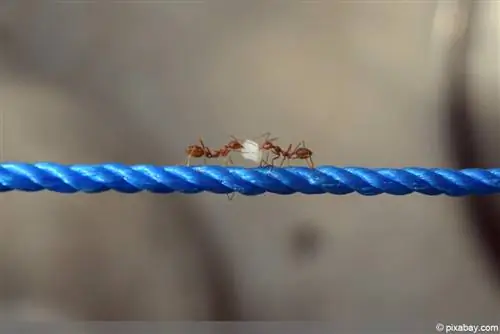
When an ant infestation occurs, the first thing you notice is ant trails in the apartment or on the property. These form the path from the ant nest to the food source. Ant trails are marked by scents and more and more ants find their way to food. Barriers on the ant trails mean that the animals on this route can no longer get enough food and have to relocate. Suitable barriers can be created by - taping with adhesive tape
Chalk line through the ant street
Distribution through fragrances
Ants are sensitive to various scents. The smell of
- Laurel
- Lavender
- Cinnamon
- Carnations
don't like them. They quickly run away.
If you notice the annoying insects in your home, you should lay out small piles of cloves, lavender flowers, cinnamon or a few bay leaves along the ant trails. Sprinkling the ground spices also helps. This spreads a pleasant scent throughout the apartment and the little crawlies are gone. It is also possible to use cinnamon, bay leaf, lavender or clove oil. These essential oils are available to buy in small bottles. A few drops in the strategically important places are enough to put an end to the pests.
Tip:
Never use essential oils directly on furniture surfaces, this can cause permanent damage.
Dispel with citric acid or vinegar
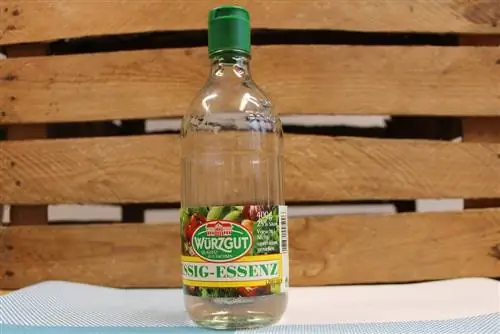
The ant doesn't just dislike special smells, it also dislikes the taste of lemons. If you sprinkle fresh lemon juice on the ant trail or lay out a cloth soaked in lemon juice, you will quickly get rid of the insects. Citric acid is also an effective old home remedy for removing limescale deposits. You can use diluted citric acid to remove dirt from tiles and cupboards, especially in the bathroom and kitchen. A positive side effect is that it drives away the ants.
Attention:
Citric acid is non-toxic, but it can harm sensitive skin. Be sure to use gloves when using citric acid. Vinegar has a similar effect to citric acid. By the way, just using cleaning products that contain citric acid or vinegar can prevent an ant invasion.
Distribute with dishwashing detergent
Commercial dishwashing detergent can prevent ant infestation. Mix a few squirts of dishwashing detergent with a liter of hot water. Wipe the affected areas thoroughly with it. The pests will avoid the cleaned areas.
Did you know:
that wood ant pupae used to be a popular commodity? In Austria, Bavaria and Bohemia these were sold as bird food by so-called ants.
Barriers with baby powder
The consistency of powder is unpleasant for the ant. If baby powder is sprinkled along the ant trails, the little creatures will avoid these areas from now on.
Barriers with coffee and coffee grounds
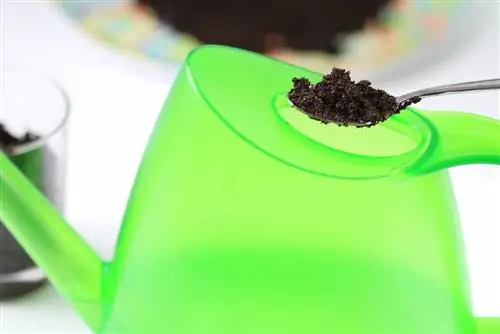
Ground coffee drives away ants permanently. Distribute coffee powder along the ant trail. The insects don't like this at all and disappear quickly. Outdoors, coffee grounds help to drive away insects. This also acts as a natural fertilizer on beds and helps to loosen the soil.
Barricades with lemon peels
An ant invasion in the garden can be successfully prevented by sticking lemon peels into the ground. This method makes it possible to keep insects away from the terrace or the seating area in the garden, for example.
Wash Away
A very simple natural remedy against ant infestation in flower pots is to rinse them repeatedly with water. Alternatively, you can place the affected flower pot in water up to the edge for a while. The pests leave the potting soil in a few moments and look for a solid and dry surface.
Fighting aphids
Aphids damage plants in the garden. They consume the plant matter and excrete a sweet end product, honeydew. The ant loves honeydew and in order not to have to go without it, it protects the aphids from ladybugs. When plants are infested with aphids, the ants are not far away either. These not only protect the plant pests, they also undermine the plants.
Fighting aphids drives away the ants. If these no longer get honeydew, they will disappear on their own. If the infestation is small, aphids on leaves can be wiped off with soapy water or milk. Garlic decoction, which is sprayed over the affected plants, helps on the beds. A few garlic plants scattered around the garden help to spoil the aphid and ant's stay. Both don't like the smell of garlic.
Fragrant potted plants
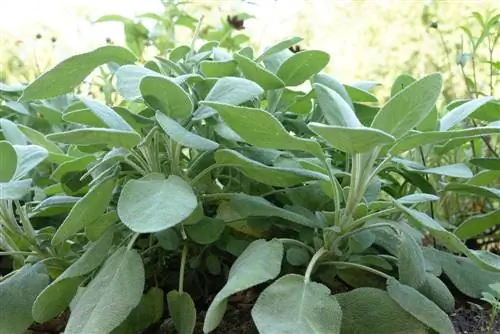
The most decorative way to prevent ant infestation without poison is to place flower pots with scented plants at the entrance to the house and on the terrace. Strongly scented plants such as lavender, thyme, rosemary and sage look beautiful and prevent ant invasion in your home.
Wormwood Manure
If an ant colony causes damage in your garden, you can successfully drive them away with wormwood manure. However, this method is only recommended at a sufficient distance from the house, because the smell of wormwood manure is also very unpleasant for people.
- Add 30 grams of dried wormwood to 10 liters of water
- Let the mixture stand for two weeks
- Pour manure into the ant hole
Effective prevention
You can take preventive measures to prevent ant infestation in your home.
- Seal cracks and crevices tightly so that the pests cannot get into the house
- Draw chalk lines around the apartment or house
- do not leave sweet foods unsealed
- Empty trash cans frequently
- Remove fallen fruit in the garden
- do not leave filled food bowls
No baking powder please
Not every home remedy is recommended. If you want to effectively repel the beneficial insects but not kill them, you should avoid using baking soda. When an ant consumes baking powder, the baking soda contained in the baking powder expands in the ant's stomach. The animal dies miserably, its stomach bursts. All home remedies that contain unpleasant scents for the small animals and force them to relocate are the remedies of choice.
Buy organic products
If you are looking for a natural ant repellent without insecticides, you will also find it in stores. Numerous manufacturers rely on ant control without poison based on essential oils and offer a wide range. You have the choice of buying the natural remedies or making them yourself inexpensively using our tips. Try it!

